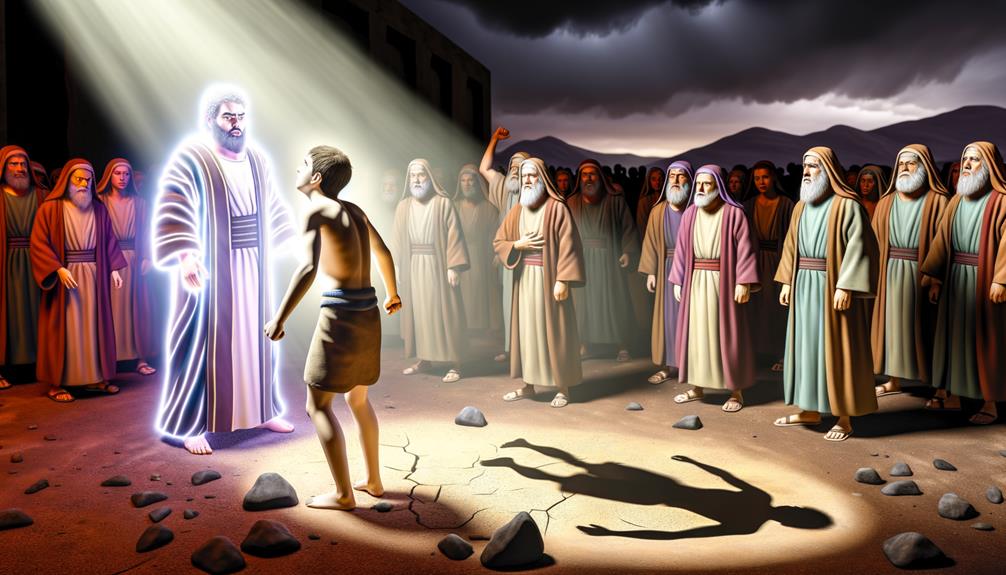Korah in the Bible Meaning: Consequence
Korah in the Bible symbolizes a notable insurrection against divinely sanctioned authority, as narrated in Numbers 16:1-35. A Levite, Korah spearheaded a coalition that included Dathan, Abiram, and 250 prominent leaders, challenging Moses and Aaron’s leadership by claiming all Israelites were equally holy.
This mutiny underscores a critical scriptural theme regarding the sanctity of divine order and the dangers of insubordination. The dramatic divine retribution, wherein the earth swallowed the rebels, affirms the theological principle that defiance against God’s chosen leaders is ultimately rebellion against God Himself.
Further exploration reveals profound lessons on authority, obedience, and communal harmony.

Korah in the Bible: Rebellion, Judgment, and Leadership Lessons
| Name | Korah |
|---|---|
| Biblical Reference | Numbers 16 |
| Tribe | Levite (descendant of Kohath) |
| Main Event | Led a rebellion against Moses and Aaron |
| God’s Judgment | The earth opened and swallowed Korah and his followers |
| Spiritual Insight | Warns against pride, rejecting divine authority, and the consequences of rebellion |
| Legacy | Some descendants later served faithfully in temple worship (Psalm titles) |
Korah’s Rebellion

Korah’s Rebellion, as described in the Book of Numbers, represents a significant moment of dissent and challenge to Moses’ leadership within the Israelite community. Historically, Korah, a Levite, joined forces with Dathan, Abiram, and 250 community leaders to question Moses’ and Aaron’s authority.
Scripturally, this event is detailed in Numbers 16:1-35, highlighting Korah’s claim that the entire congregation was holy and questioning why Moses and Aaron exalted themselves above others. Theologically, Korah’s challenge is interpreted as a direct affront to God’s chosen leadership structure.
This rebellion underscores themes of divine authority, communal sanctity, and the consequences of insubordination. Understanding Korah’s motives and the resulting divine judgment offers insight into the importance of obedience and the recognition of divinely appointed roles.
Moses and Aaron’s Response

Moses and Aaron’s response to Korah’s rebellion, as depicted in the Book of Numbers, underscores the gravity of challenging divinely appointed leadership and serves as a demonstration of their unwavering faith and reliance on God’s judgment.
Historically, this event highlights the centrality of divine authority in the Israelite community.
Scripturally, Moses fell face down in humility (Numbers 16:4) and proposed a test to reveal God’s chosen leaders, emphasizing his submission to divine will.
Theologically, their actions reflect a deep trust in God’s providence, contrasting human ambition with divine order.
Moses’ call for God’s intervention (Numbers 16:15-22) illustrates an adherence to spiritual integrity, relying on divine justice rather than personal vindication, thereby reinforcing the sanctity of their leadership.
The Consequences of Korah’s Actions

The aftermath of Korah’s rebellion, as recorded in Numbers 16, serves as a profound witness to the severe consequences of defying God’s ordained leadership within the Israelite community.
When Korah, along with Dathan, Abiram, and 250 community leaders, challenged Moses and Aaron, divine retribution was swift and unequivocal.
The earth opened and swallowed the rebels, their households, and their possessions, while fire consumed the 250 men offering incense.
This dramatic judgment underscored the gravity of their insubordination and served as a divine affirmation of Moses and Aaron’s leadership.
Theologically, it illustrates the sanctity of God’s chosen instruments and the peril inherent in rebellion against divinely established order, reinforcing the importance of obedience to God’s will.
Lessons on Authority and Obedience

In light of the severe consequences witnessed in Korah’s rebellion, it becomes imperative to explore the broader lessons on authority and obedience as depicted in biblical scripture.
Historically, Korah’s defiance against Moses and Aaron challenged God-ordained leadership, underscoring divine authority.
Scripturally, Numbers 16 illustrates that rebellion against divinely appointed leaders equates to rebellion against God Himself.
Theologically, this episode emphasizes the sanctity of divine order and the importance of obedience to God’s will.
It serves as a cautionary tale, reminding believers that true authority is divinely instituted and must be respected.
Understanding this, followers are called to discern and uphold rightful leadership, fostering unity and reverence for God’s established hierarchy.
Modern Interpretations and Relevance

Examining the story of Korah through a modern lens reveals enduring principles about the nature of authority and the consequences of dissent against divinely sanctioned leadership.
Korah’s rebellion against Moses, as recounted in Numbers 16, serves as a cautionary tale with contemporary applications. This narrative underscores the importance of respecting established leadership and the potential fallout of insubordination.
Modern interpretations highlight several key themes:
- Authority and Legitimacy: Understanding the divine endorsement of leadership structures.
- Unity vs. Division: The impact of dissent on communal harmony.
- Divine Judgment: The spiritual ramifications of challenging divine authority.
These principles continue to resonate, offering insights into the balance between authority and accountability in today’s contexts.
Conclusion
Korah’s rebellion serves as a stark reminder of the perils that arise when divine authority is challenged. The earth swallowing the dissenters underscores the gravity of defiance against ordained leadership.
This narrative, rich with theological insights, illustrates the paramount importance of obedience and reverence for sacred hierarchy.
Contemporary reflections on Korah’s fate evoke a clarion call to uphold divine order, resonating through the ages as a timeless lesson in humility and submission to divine will.






